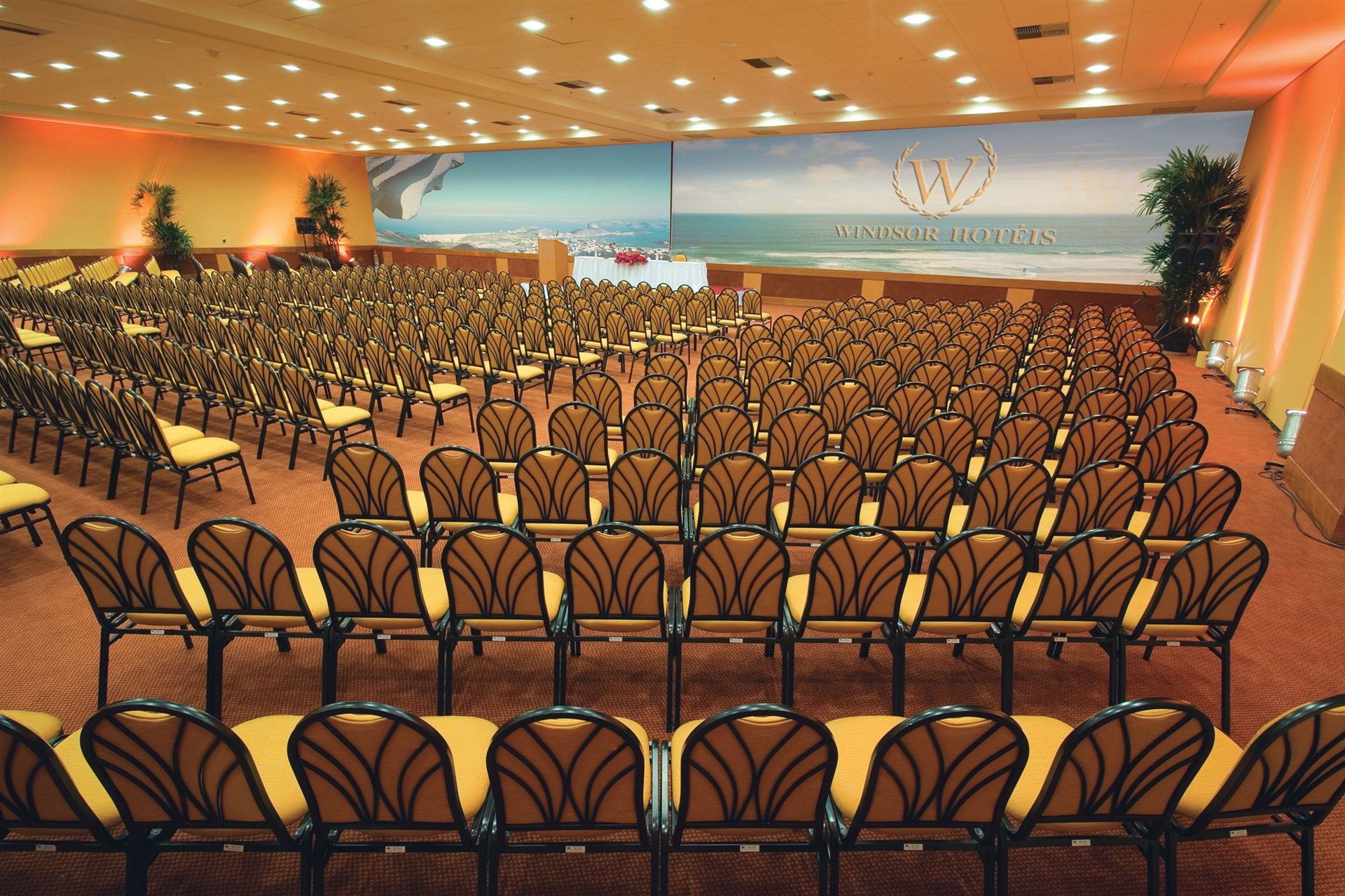
Windsor Barra Hotel
Officially recognized by Guta 4 Rodas, editions 2009 and 2010, the Windsor Barra Hotel is the best hotel for events in Brazil.
Located in Barra da Tijuca, it has the largest and most well-equipped event area of the Rio hotel with 60 modern rooms in more than 9,000 square meters and independent access from the hotel. We experience in conducting small events, medium and large our differential across the market.
The Windsor Barra Hotel offers a complete structure in every way for the realization of events, exclusive parking to the restaurant for up to 550 people.
His bold architecture combines beauty and practicality, in five different floors facilitating movement. A convention center that does everything for your event to be a success.
About Rio de Janeiro
Av. Lucia Costa, 2630, Barra da Tijuca, Rio de Janeiro
THERE ARE TWO AIRPORTS IN RIO DE JANEIRO.
GALEÃO – TOM JOBIM INTERNATIONAL AIRPORT (GIG). located on Governors Island is easily accessible by modern highways. the center and the south of the city, where the major hotels. Twenty-six international airlines and all Brazilian airlines operating at the airport, which recorded in 1998 a movement of about 8 million passengers between domestic and international flights.
TEL – INFORMATION: (+55 21) 3004-6050
FLIGHTS: (+55 21) 3398-4527 / 3398.4526
SANTOS DUMONT AIRPORT (SDU). located in the city center, operates regional flights linking the main cities of the country, business jets and smaller aircraft. An excellent taxi service and bus links the airport to the main hotels and residential areas.
INFORMATION AND FLIGHTS: (•55 21) 3814-7070
About Rio de Janeiro
Rio de Janeiro is the most visited destination in Brazil by foreign tourists for leisure trips, and the second place for business travel.
If you want to know the best places to eat, visit, stay, visit: Rio Guide and be amazed by the wonderful city.
Rio de Janeiro, commonly referred to simply as Rio, is the capital city of the State of Rio de Janeiro, the second largest city of Brazil, and the third largest metropolitan area and agglomeration in South America, making it the 6th largest in the Americas, and 26th in the world. Part of the city has been designated as a World Heritage Site, named “Rio de Janeiro: Carioca Landscapes between the Mountain and the Sea”, identified by UNESCO on 1 July 2012 in the category Cultural Landscape.
Founded in 1565, by the Portuguese, the city was initially the seat of the Captaincy of Rio de Janeiro, a captaincy of the Portuguese Empire. It later, in 1793, became the capital of the State of Brazil, a State of the Portuguese Empire. In 1808, when the Portuguese Royal Court transferred itself from Portugal to Brazil, Rio de Janeiro became the chosen seat of the court of Queen Maria I of Portugal, who subsequently, in 1815, under the leadership of her son, the Prince Regent, and future King João VI of Portugal, raised Brazil to the dignity of a kingdom, within the United Kingdom of Portugal, Brazil, and Algarves. Rio stayed the capital of the pluricontinental Lusitanian monarchy until 1822, when the War of Brazilian Independence began. It subsequently served as the capital of the independent monarchy, the Empire of Brazil, until 1889, and then the capital of a republican Brazil until 1960.
Rio de Janeiro represents the second largest GDP in the country (and 30th largest in the world in 2008), estimated at about R$343 billion (IBGE/2008) (nearly US$201 billion), and is headquarters to two of Brazil’s major companies—Petrobras and Vale, and major oil companies and telephony in Brazil, besides the largest conglomerate of media and communications companies in Latin America, the Globo Organizations. The home of many universities and institutes, it is the second largest center of research and development in Brazil, accounting for 17% of national scientific production—according to 2005 data.
Rio de Janeiro is one of the most visited cities in the southern hemisphere and is known for its natural settings, carnival celebrations, samba, Bossa Nova, balneario beaches such as Barra da Tijuca, Copacabana, Ipanema, and Leblon. Some of the most famous landmarks in addition to the beaches include the giant statue of Christ the Redeemer (“Cristo Redentor”) atop Corcovado mountain, named one of the New Seven Wonders of the World; Sugarloaf mountain (Pão de Açúcar) with its cable car; the Sambódromo, a permanent grandstand-lined parade avenue which is used during Carnival; and Maracanã Stadium, one of the world’s largest football stadiums.
The 2016 Summer Olympics and the Paralympics will take place in Rio de Janeiro, which will mark the first time a South American or a Portuguese-speaking nation hosts the event. It will be the third time the Olympics will be held in a Southern Hemisphere city. Rio’s Maracanã Stadium, which held the final of the 1950 FIFA World Cup, will host the final match of the 2014 FIFA World Cup. Rio de Janeiro also hosted the World Youth Journey in 2013.
GENERAL Information
Language
Portuguese is the national language, but the accent and intonation are quite different from the language spoken in Portugal and other former Portuguese colonies. There are many Brazilians descending from immigrants who speak German and Italian, especially in the South of Brazil. The majority of the population understands Spanish. English is the most spoken language in the tourism industry, such as hotels and airports.
Currency
Real (R$) is the Brazilian currency. Most business establishments accept credit cards. To find out about the currency rate for foreign currencies, access: www4.bcb.gov.br/pec/taxas/port/ptaxnpesq.asp?id=txcotacao
Time Zones
Due to its continental size, Brazil has 3 different time zones. Rio de Janeiro follows the Brasilia time (three hours less than Greenwich Mean Time). The city is practices daylight saving time between October and February, when the clocks are advanced one hour.
Climate
Climate is predominantly tropical, with some variations according to the region. The average annual temperature is 28ºC in the North and 22ºC in the South.
Airports
Before travelling, check the website www.infraero.gov.br. There, you will find information to prepare your air travel. The site has hints on baggage, times, documentations, installations, airport services, among others.
The city of Rio has three commercial airports: The Santos Dumont airport, located downtown, which serves the Rio-São Paulo route and domestic and regional flights.
The Galeão or Antônio Carlos Jobim International Airport – in honor of the renowned Brazilian conductor, composer, and singer who died in 1994. Located at Ilha do Governador, at the northern area of the city, it is an important gateway to Brazil.
The Jacarepaguá airport, also called Roberto Marinho Airport, installed in the Western area of the city is dedicated to private and regional flights for small aircrafts. The airport serves non-regular flights for air taxi services and is provided with service infrastructure.
Taxi
Tourists may choose to use the so-called common taxi, found easily in the streets or use the radio-taxi service. Accredited taxis at airports and at stops near hotels should be preferred. It is not a habit to tip taxi drivers in Brazil, but rather round up the total amount as a gratuity.
Safety
As in any large city, it is important to take personal safety into account. Beware of your belongings and avoid going out with laptops, cameras, electronic devices and fully visible. Please find below some emergency numbers:
190 – Military Police
192 – SAMU (Service Mobile Emergency)
193 – Firemen
197 – Civil Police
Telephone Service
To make an international call, dial: 00 + operator code* + country code + area code (e.g., 21 for Lisbon) + destination number. For collect international calls, dial 08007032111.
*Main Operators:
Brasil Telecom 14
Telefônica 15
Embratel 21
Intelig 23
GVT 25
Telemar 31
CTBC 34
The area codes for the most visited cities in Brazil are:
São Paulo: 11
Rio de Janeiro: 21
Belo Horizonte: 31
Foz do Iguaçu: 45
Brasília: 61
Salvador: 71
Manaus: 92
Immunization
Residents or travelers to the listed countries within the previous 10 days before arrival in Brazil require immunization against yellow fever.
The International Certificate against yellow fever must be present at arrival in Brazil: Republic of Angola, Benin, Bolivia, Burkina Faso, Republic of Cameroon, Colombia, Ecuador, Gabon, Republic of Gambia, Republic of Ghana, Republic of Guinea-Bissau, French Guiana, Republic of Liberia, Federal Republic of Nigeria, Peru, Democratic Republic of Congo, Republic of Sierra Leone, Sudan, Venezuela and Zaire.
Full and updated information may be found at:
CDC: https://wwwnc.cdc.gov/travel/notices/alert/yellow-fever-brazil
WHO: http://www.who.int/csr/don/20-march-2017-yellow-fever-brazil/en/
Countries requiring yellow fever vaccination for travellers: http://www.who.int/ith/2017-ith-annex1.pdf?ua=1
Anti-smoke Law
Following an international trend towards smoking restrictions, already adopted in cities such as New York, London, Paris and Buenos Aires, the State of Rio has an anti-smoke ban. The text of the new law prohibits smoking cigarettes or tobacco derivatives in totally or partially closed collective, public or private environments throughout the State. Among the prohibited areas are closed bar and restaurant areas, nightclubs, work environments, taxis, common enclosed areas in buildings. Smoking is permitted in public ways and outdoors. It is also permitted in soccer stadiums and hotel rooms.
Electricity
There are differences in the electrical current regime in Brazil. Find out about the correct voltage before using electrical appliances. An adaptor may be required for some electrical appliances.
Tips
Most restaurants and bars include a non-mandatory service fee of 10%. The usual procedure is to accept the inclusion of the 10% in the bill or even a little more if the service was satisfactory.
Credit Cards
All major credit cards are accepted in Brazil. Visa, Mastercard, Diners and American Expresses are available in most business establishments.
Foreigner Visa
The visa is a federal permit for a foreigner to enter Brazil. For most countries, it is issued only abroad; but for some, the entry and permanence of visitors in the Brazilian territory is authorized for a certain period of time, which is established according to the type of visit.
Visas are granted to foreigners who visit Brazil on diplomatic, official, tourism travels, visits to friends and family, business trips, participation in sports and art events in addition to participation in international seminars and conferences.
Foreign visitors must fill out a Visa Request Form – available in Portuguese, Spanish, French and English – individually, i.e., even if the tourist takes along a minor, he or she must fill out a separate form. And in case of a visit to Brazil without the parents or responsible person, individuals less than 18 years of age must present an authorization with the signature of both parents.
The vista request for entry in Brazil may be made at any Brazilian consulate abroad. Payment of a fee is requested and it varies according to the type of visa requested and the length of stay in the country.
In case you reside in a country that requires a Visa to enter Brazil, you may need to complete a few requirements to submit to the Brazilian embassy. The link below lists all the embassies around the world so you can locate the nearest to you in order to proceed with your visa application.
http://www.portalconsular.mre.gov.br/antes/quadro-geral-de-regime-de-vistos-1



















